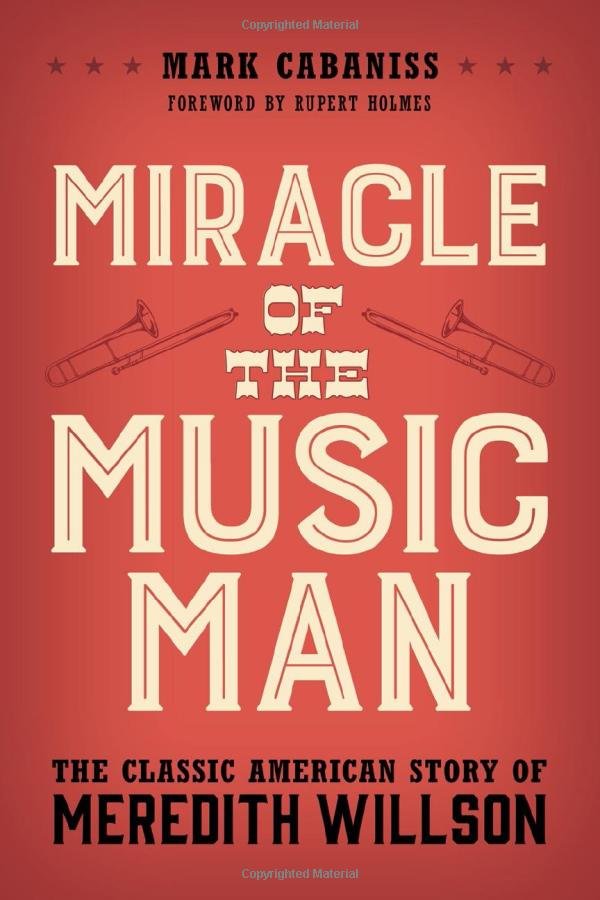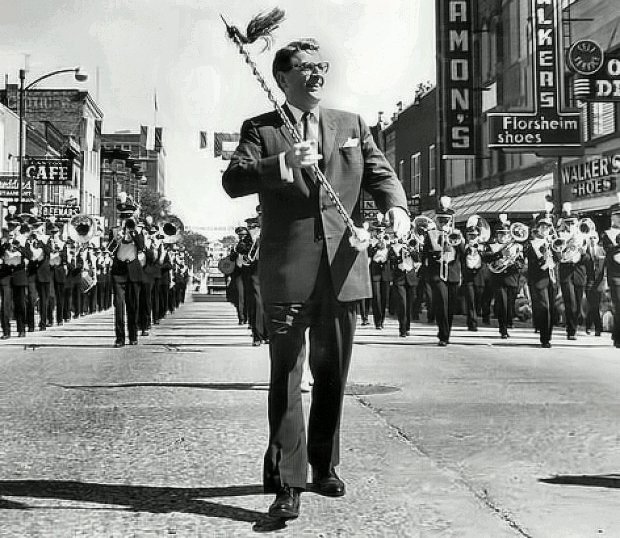Miracle of ‘The Music Man’: The Classic American Story of Meredith Willson
—Cathy Ritchie
Miracle of ‘The Music Man’: The Classic American Story of Meredith Willson
by Mark Cabaniss (Rowman & Littlefield, 2022)
Ah, the memories….
I saw my first Broadway show at age five—in fact, my first live performance of any kind. The show was The Music Man, and playing Harold Hill was the Miss America beauty pageant icon Bert Parks. Even at that young age, I was totally aware of his claim to fame. Lo these many decades later, I remember that the production was wonderful and Parks was superb. In later years, I was saddened to watch him become a figure of media mockery, as too few people knew what a fine song-and-dance actor he really was.
Fast forward a few eons, and a Music Man reincarnation was upon us, yet again bringing joy to many. The 2022 revival starred two of Broadway’s most beloved performers, Hugh Jackman and Sutton Foster, along with a Tony-Award-packed supporting cast. I wasn’t able to see this particular production, but it was wonderful knowing that this musical still has a rock-solid place in America’s affections.
Lest we forget, Music Man came to us via one man who served as its composer, lyricist and book writer: Robert Meredith Willson, who parlayed his deep affection for his small-town Midwestern upbringing into a theatrical love letter that resonated with audiences, no matter the changing artistic times swirling around him. In his Miracle of The Music Man, Mark Cabaniss pays tribute to both the show and its creator with his combination biography and “how it came to be” tale of the legendary musical.
Willson was born in Mason City, Iowa in 1902. Music became his primary activity at an early age, and he went on to master the flute, piccolo, and bass drum. The list of his musical accomplishments would always be long and stellar, even beyond his Broadway triumph: he was, in fact, a conductor, musical arranger, bandleader, and radio actor/host long before “River City” entered his thoughts. As a composer, he wrote numerous stand-alone songs: “It’s Beginning to Look a Lot Like Christmas” is likely his most popular. Hollywood recognized his talents as well: he contributed to the classic film scores of The Great Dictator and The Little Foxes.
But Willson spent most of the 1950s on what became his magnum opus, or, as he described it, “an Iowan’s attempt to pay tribute to his home state.” Music Man took eight years to materialize, with Willson reportedly writing more than 40 songs, some featuring unique arrangements and “tricks,” including the one that stayed in the show: salesmen on a train imitating the rhythm of the rails with only their voices. Aligning himself with producer Kermit Bloomgarten and director Morton DaCosta was a turning point.
Much discussion was devoted to exactly who would play Harold Hill. Danny Kaye and Dan Dailey were early prospects, until a relatively unknown B-picture actor named Robert Preston was recommended. The rest, as they say, was Broadway history as Preston delivered a performance for the ages, both on stage and later on screen.
The Music Man opened in 1957, during a veritable golden era for the Broadway musical. Willson’s love letter to Iowa won the Tony Award for Best Musical, defeating the juggernaut known as My Fair Lady, a fact that still astounds me.
But of course, his phenomenal success only led audiences to chant “What’s next?” That "Next” arrived in 1960 with the moderately successful The Unsinkable Molly Brown, starring Tammy Grimes in a Tony-winning performance. While Willson stayed busy with various musical commitments, including other stage shows, he never again achieved Music Man’s enormous success.
But that was OK.
Willson was, by all accounts, a naturally humble, gracious, and gregarious artist, finding constant joy within his profession. Between music gigs, he wrote three memoirs. And in his later years, prior to his 1984 death, his philanthropic instincts took center stage, as he funded a residence hall at The Julliard School, and several arts and recreation centers in his Mason City hometown. He also received a posthumous Presidential Medal of Freedom and was featured on a postage stamp. A quintessential homespun American? Apparently, yes.
Cabaniss’s brief yet informative book paints an enlightening picture of a man who may have appeared to be a “one-hit wonder,” Broadway style, but was indeed a prolific creator in multiple musical genres—who kept his down-home personal positivity through it all.
One mild caveat: Cabaniss’s writing style generally falls into the “casual” camp, including occasionally jarring parenthetical comments and observations that veer perilously close to out-and-out cuteness. But he offers readers a solid view of a remarkable man and his still-legendary creation.
Had Robert Meredith Willson been present at the Winter Garden Theatre on January 15, 2023, to witness the audience’s closing-performance outpouring of love and gratitude for Jackman, Foster and the outstanding co-stars of the Music Man revival, it would have been clear that along with his Harold Hill, Willson himself did indeed “know the territory”—and how to tell its story. This former five-year-old will always be grateful he did.

